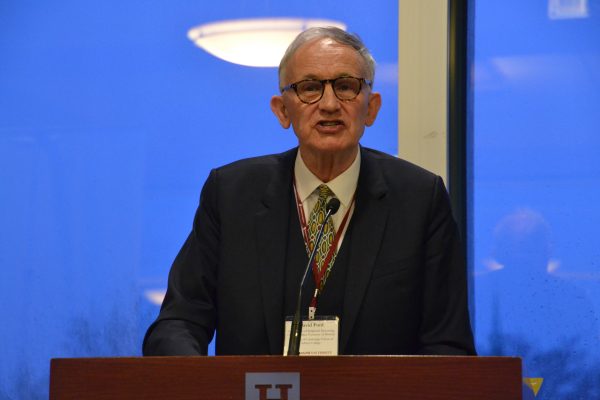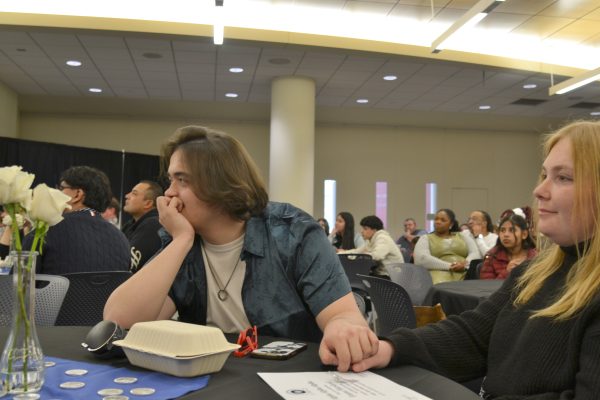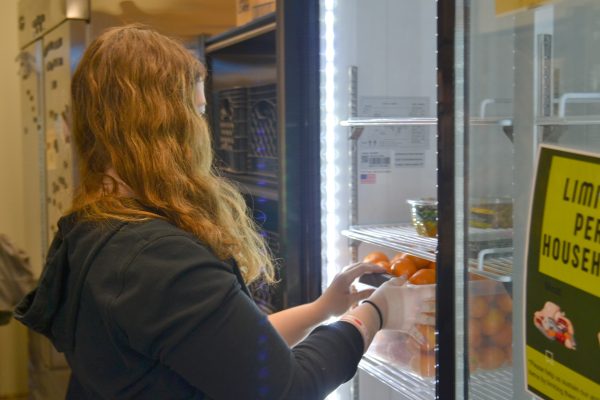Student leaders step up for spring selection
Over 170 students applied for leadership positions on campus for the 2014-15 school year, including Residential Advisers, Summer Residential Advisers, Summer Conference Staff, Residential Housing Association members, Programming Board members, First -Year New Student Mentors, Transfer New Student Mentors, Sophomore Experience Interns and Student Diversity Ambassadors. After various interviewing and selection processes, all students that applied received a yes or no letter regarding a student leadership position last Wednesday, March 5.
Residential Housing Association
“Everyone that lives on campus has an RA, every freshman has an NSM, so they’re a little more visible. I think we sit a little more in the background sometimes,” said sophomore and RHA President Rachel Mazac. “We’re trying to be more of a force on campus. We want to step up and say, ‘hey we’re an organization and we have student leadership positions that are influential on campus. We have opportunities to be a part of your changing community at Hamline.’”
Residential Housing Association (RHA) is the executive board for housing on campus that oversees the four hall councils in each of the residence halls, assists in residence hall capital improvements, and plans major programming events like the Late Night Study Breakfasts and Haunted Hallway for all Hamline students.
Although their positions are based on programming, RHA members go through the same training as Residential Advisors. “We want them to be exposed to the same training that talks about diversity, social justice, programming,” RHA Advisor and Area Coordinator Gaith Hijazin said. “But they also have their own training as well.”
To become more visible, the current RHA board is planning an Amazing Race event open to all students on Sunday, April 13. The event will be based on the popular “Amazing Race” TV show, complete with a map, clues and challenges around campus for teams of two to complete. The top six teams will receive prizes such as money and gift cards.
RHA has asked other organizations on campus to participate and set up their own challenges. “It compliments our Haunted Hallway event,” explained sophomore and National Communications Coordinator Maggie Knorr.
“It’s about bringing different orgs together on campus to put together a challenge.”
Mazac and Knorr are still communicating with organizations on campus, but so far between 8-12 student groups, including the fraternity Theta Chi and sorority Delta Tau, have expressed interest in being a part of the event.
Hijazin is excited for Mazac’s and Knorr’s Amazing Race event. “I thought it was a great idea,” he said. “I’ve talked to other schools that have done it and they said that it was such a positive experience.”
According to Hijazin, RHA originally planned to make it an ACTC campus event. But they didn’t receive many responses from other schools, so they decided to keep it Hamline-based.
RHA plans to do some tabling and send out emails for teams of students to register for the Amazing Race after spring break. According to Mazac, they’re hoping to sign up at least 25 teams.
But, “the more the merrier” Knorr said.
Besides working to create more events on campus, RHA has gone through a series of changes regarding their selection process of board members. The board has a total of eight representatives: two Programming Communications Coordinators, a Treasurer, a Historian, a Public Relations Chair, a National Residence Hall Honorary and Mazac’s and Knorr’s positions of President and National Communications Coordinator.
The Programming Communications Coordinator positions were new this year, making eight members the largest RHA board yet. “Because of the amount of work that we do, we want to make sure that it gets done,” Mazac said.
In addition, the board used to be selected through an election process, but are now selected by Residential Life staff and other RHA members. This is the first year that RHA was a part of the student leadership selection process with the other organizations on campus.
Hijazin explained that one of the reasons for initiating the change is that the RHA members’ roles are comparable to the job description of students who work for the Programming Board in Student Activities, which is based on a hiring and selection process.
During one of the elections in the last few years, a student was written in to be a representative as a joke or prank, and they ended up winning. The student quit after a few months. “We want people who do the job to be committed for the job, and want to be committed 100 percent,” Hijazin said.
Last year Mazac was elected into her position as President, but this year she was selected by RHA.
“Rachel [Mazac] was the only one that applied for the position. Not a lot of people know about RHA unfortunately,” Hijazin said. “We’re trying to create more of a presence on campus.”
Knorr’s position was selected by Residential Life staff as well. “It is also selected because of the importance of it,” Mazac said.
“I run all the hall council elections in the fall, as well as the training for that, and organize [trips to] conferences,” explained Knorr. Last fall, RHA went to a national residential life conference in St. Louis and last year they attended it in Pittsburgh.
Mazac, Knorr and Hijazin then go through applications and select the other six positions for RHA.
“We were looking for people who have a genuine interest in residence halls, and making Hamline a community that people want to live in and be a part of,” Mazac said. “[Also] all that goes along with what you are as a Piper—diversity, leadership and service—so things that people are involved in.”
Quite often, students who were a part of their hall councils choose to apply to be on RHA, which is the umbrella organization that oversees the four hall councils. Mazac and Knorr were both on the hall council in Sorin during their first year at Hamline.
“They’re familiar with the work, they’ve fallen in love with the work, they’ve traveled to conferences. They’re like, ‘This is what I want to do. I want to be a student leader, but I don’t want to deal with conduct or be restricted to living in a certain place, and have to be here for the weekends, but I want to be involved in programming,’” Hizjazin said.
Another recent change to RHA is in the increase in compensation. It was raised from $375 a semester to $500 a semester. Costs involved with attending conferences are also part of the compensation.
Overall Mazac and Knorr enjoy the influence they have to make changes in their community.
“I like how we have the opportunity to bring people things on campus that maybe they wouldn’t have otherwise,” Mazac said. “If someone comes to us with a problem and says ‘I wish we had a lounge here, or a TV in this area, or a better microwave here,’ they bring those things to us and we process it and try to get them done.”
Knorr likes seeing the growth of the first-year students. “It’s [hall council] a really great way to get people involved and get to know each other,” she said. “I know that first-year communities especially can be really close sometimes, so sort of fostering that.”
New Student Mentors
This year, more students applied to be New Student Mentors (NSMs) for less positions than were available the previous year. The student applicant pool increased by 30 to 104, and the number of NSM positions available reduced from 38 to 36, although some NSMs will be partnered to serve the 32 First-Year Seminars (FYSems).
“Not only did we have a large increase in applicants, we had over half that applied solely for this position or ranked it as their first choice,” Orientation and First-Year Programs Director Becky Kaarbo said in an email. In previous years, NSM has often been ranked as a second choice for students over other positions like RA.
All applicants went through a group interview observed by a staff member or student in Student Activities. Then they each went through two individual interviews conducted by other staff or students from Student Activities. “This way we have plenty of feedback from various people in order to make the best decision possible,” wrote Kaarbo.
Kaarbo has noticed in the past that having too many returning NSMs can affect the group dynamic, so she only hires up to one-third of the returning staff. But everyone has to apply and go through the same interview process. “In the end, we are looking for the overall best team, and no one is guaranteed a spot from year to year,” she wrote.
First-year and future NSM Sarah Campbell thought the selection process was good practice for applying for a job. She specifically liked the short answer questions on the application that asked the student why they were applying for the position. “Finding out people’s reasons for applying offers good insight, and is a good way to find out their motivations over an interview,” she said.
Campbell was a part of a similar mentoring program in high school, which is why she applied to be an NSM. “I had a really good experience and connected with people, some of the students I mentored in high school I still talk to today,” she said. “I really wanted to be a part of that here at Hamline too.”
Someone that can make strong connections with others is one of the key qualities that Kaarbo looks for in applicants. “First, I look for someone I know I can make connections and sustain connections with their First-Year [Seminar] and be a good role model in and outside of the classroom,” she said in an email. “I think there is a history on this campus that the NSM’s job is done after [Piper] Passages and that is not the case. I have very high expectations for [the] role they play throughout the first semester and really beyond that as well.”
Not only does Kaarbo look for students who are approachable and welcoming, but ones also have various personality types and styles. “Not all NSMs need to be the ‘cheerleader’ type. They shouldn’t all be loud and full of energy. They need to be positive and true to themselves,” explained Kaarbo. “It is important that incoming first years can see themselves (whether it be as an athlete, a student of color, an introvert or anything in between) in at least one of the members on the staff.”
Junior Kami Ehrich, who was hired to be an NSM for next year, is looking forward to connecting and guiding first year students. “I want to encourage incoming freshman to take advantage of all that Hamline has to offer,” she said. Ehrich feels that she has accomplished this by studying abroad, working with professors and joining student orgs on campus.
Compensation for NSMs doubled this year. Previously, they were paid $100 per preview and one $300 stipend, but they will now receive $200 for each Piper Preview session they work, $300 at the conclusion of Piper Passages and then $300 again at the end of fall semester. They also receive free meals during training and events, Hamline apparel and can move in on campus early at no extra charge.
“The reasons for these changes are because they work really hard, and deserve more money in my mind,” Kaarbo said in an email. “Also, [this is] to help make sure after Passages [that] expectations are met.”
Programming Board
A new position called “Homegrown Programmer” was added to the Programming Board staff this year, bringing the total number of members up to eight. “That change was born out of an increase in demand for smaller-scale, interactive events such as the Pumpkin Carving, Mug Painting and Sculpi (polymer clay) crafting events we did this year,” said Coordinator of Student Activities Lacey Squier in an email.
Also, the title of the position “Senior Programming Assistant” was altered to “Development & Outreach.” According to Squier, in some ways this change was based on semantics. “However, the position will have a renewed focus on reaching out to other student organizations to encourage collaborations, while still focusing on developing the board as team,” she wrote.
The Hamline University Programming Board (HUPB) is a student-led staff that coordinates a variety of social, entertainment and educational programs for the Hamline community throughout the year, including Fall Welcome Week activities, Homecoming and the upcoming annual Fireball dance.
Board members receive compensation of $2,000 that is paid in four installments throughout the school year. “Additionally, they receive a handful of HUPB-sponsored shirts, jackets and other regalia to wear at strategic times for marketing and event-management purposes,” Squier said. They also all attend the National Association of Campus Activities regional conference for free.
This year, 19 students applied and were interviewed for the eight available positions, which was on par the size of last year’s applicant pool. Each interview was conducted by Squier with a current programming board member. Squier said that the current members appreciated being part of the interview process. “It really gave them some insight to the process of hiring, and hopefully helped hone their skills as potential job candidates,” Squier wrote.
However, there were no returning board members to the program this year, but there were some returning members from the Very Involved Pipers (VIP) or volunteer program. This program allows students “to experience working with Programming Board at their own level and their own paces, as opposed to being programmers and being require to be at almost everything,” Squier said.
She did admit that in a way not having returning members can be frustrating, “because you could argue we are at risk for losing momentum or continuity from this year to next.” However, “having those VIPs return next year as programmers and coordinators on the board will alleviate some of that concern about continuity etc. because they have so much experience already,” she said.
Squier looks for various traits in potential applications. She says that one of the most important qualities of all is enthusiasm: “simply an enthusiasm for Programming Board’s mission of providing programming for the entire undergraduate student population,” she explained.
Even if a student does not have previous experience in programming, Squier believes that passion can make up for shortcomings with some guidance. “I also certainly appreciate a well-researched and well-spoken applicant who can articulate the value of what HUPB does for Hamline. Lastly, I look for authenticity. I love it when applicants let their personalities shine through!”





